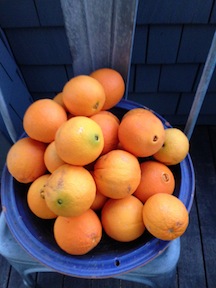âTo me every hour of the day and night is an unspeakably perfect miracle.â Â
                 ~ Walt Whitman
Despite Valentineâs Day, familial birthdays, and President Day holidays, the second month of the year is notoriously my least favorite on the calendar because of wintery weather. This year, however, sunshine has been the mainstay for weeks and now I find myself preoccupied with the looming drought. A few days ago on the morning of my Motherâs birthday, minutes before she left to celebrate her big day at a luncheon, we were on the phone lamenting the lack of water and the dire forecast for our newly planted vineyards. Two miles from our farm, a laborerâs truck slammed into her at full speed. Her car flipped, hit a tree, and rolled into a ditch. Both vehicles were totaled. It was a miracle that everyone survived the collision with only minor cuts and bruises. At that moment, we rejoiced for the lack of rain else that creek might have been rushing and the outcome of the accident may have differed. Although sore, my Mom was back digging in her garden the next day, despite stitches in her arm and wearing a sling. Life is precious and itâs important to appreciate every second. Rain, shine, freeze, or drought, we are all in the circle of life together. February is our reminder of the importance of uttering âI love youâ often. I love you.
- â« RE-THINK your garden for the year by planning for drought and fire resistant plants. Sage, lavender, ice plant, bulbs, natives, and succulents will add beauty, fragrance, and form with little water.
- â« REFRAIN from pruning any freeze damaged plants. Wait until all danger has passed, usually the end of March.
- â« SPRAY fruit trees and roses with a final dose of horticultural oil mixed with water. The oil kills most mites, insect eggs, scale, and insects.
- â« REMOVE up to 87% of household pollutants by adding houseplants to your interior spaces as air filters. Plants pump life giving oxygen and moisture through their breathing. Consider fuss free Chinese evergreen, sanseviera (aka snake plant), or a desktop sago palm, all tolerant of low light and dry conditions.
- â« EMBRACE the tangy flavor of kumquats by planting a small tree in a large container by your kitchen. Bright shiny leaves with a citrus fragrance and tiny fruit that taste like a cross between sour limes and tangerines await. Kumquats are an exotic addition to mixed drinks and pies.
- â« ADMIRE the structure and architecture of your trees, both deciduous and evergreen, surrounding your property. When you get up close and personal, youâll find beauty in their winter wardrobes.
- â« VISIT the UC Botanical Gardens in Berkeley, the third largest botanical garden in the United States with its well-labeled collection of over 12,000 taxa covering thirty acres, including many endangered species. Check out the botanical garden from the University of California Berkeley for information on special events.
- â« CONSERVE water by using gray water to irrigate potted plants. Unless we get rainfall soon, California will initiate mandatory rationing as opposed to the 20% voluntary savings.
- â« BRIGHTEN the garden with bergenia. Even after a freeze, bergenia shoots up pretty pink blossoms.
- â« MULCH your garden with at least three inches of organic matter to control temperature, fight erosion, and maintain moisture.
- â« SHORT on space? Vertical gardening and living walls offer effortless, space saving green environments providing privacy screens, ambiance, and health benefits.
- â« SHARE your love of nature with someone you admire this Valentineâs. Give a living plant that will remind them of your gift for years to come.
- â« INVEST in a canvas tote bag or other reusable bag instead of using plastic or paper. Youâll save trees and help eliminate pollution.
- â« BUY your firewood from local sellers. When you transport firewood from other areas, there may be invasive tree-killing pests hitchhiking on your load.
- â« WRAP tender plants and trees (especially citrus) with blankets, plastic, or bubble wrap when another freeze or frost threatens. The cold nights are not over yet despite the warmer days.
- â« INVITE our feathered friends to dinner by filling feeders. Pluck dandelions daily and put on a plate in place frequented by California quail. Your guests will reward your efforts by eating harmful insects.
- â« PRUNE ornamental grasses to twelve inches to encourage new growth.
- â« CUT branches of forsythia, quince, flowering pear, and other early blooming shrubs as the buds swell for long lasting interior interest.
- â« INVESTIGATE the new plants debuting in 2014 such as Ms. Mars sunflower, Candy Stripe verbena, and my personal favorite, the David Austin rose, Royal Jubilee celebrating the Diamond Jubilee of Queen Elizabeth II.
- â« PLANT a salad bowl garden with greens you love to eat. A small patch of earth or even two or three containers within easy reach of the house will supply you with snippets of arugula, spinach, Swiss Chard, chives, radish, mustard, mache, and a variety of lettuces.
- â« PERUSE catalogues for open pollinated, heirloom, or other favorites of seeds, bulbs, flowers, and shrubs. Check out these sites for ideas:
www.sowtrueseed.com, www.selectseeds.com, www.rootsrhizomes.com, www.whiteflowerfarm.com, www.mzbulb.com, www.territorialseed.com, www.harrisseeds.com, www.seedsofchange.com, www.parkseed.com, www.burpee.com, www.rareseeds.com, www.seedsavers.org.
- â« EAT apples for fresher breath and healthy bodies. Did you know that the French called tomatoes ‘pommes d’amour’ or ‘love apples’ because they were convinced that tomatoes had aphrodisiac properties?
May Cupid find you this February and shoot his arrow your way. Be grateful. Celebrate love. Happy Gardening and Happy Growing!
Read more at Cynthia Brian’s Gardening Guide For February. Â
©2014
Cynthia Brian
The Goddess Gardener
Cynthia is available as a speaker and consultant.







